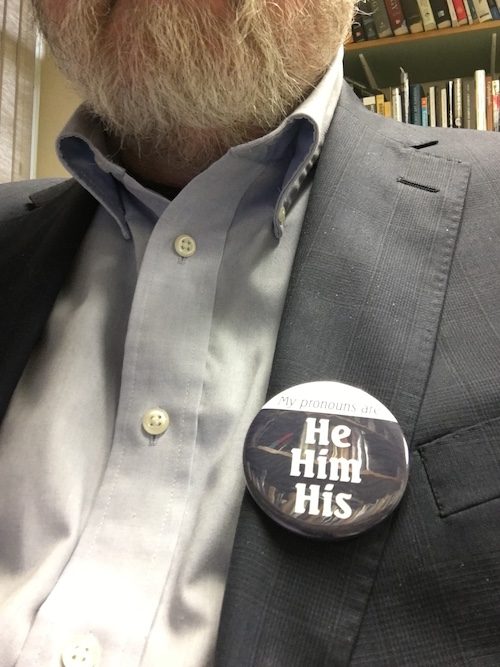It’s International Pronouns Day! I got my button.
I wonder if the UMM College Republicans got theirs? I notice that, while their president is quick to disavow any association with the flyers that have been tainting our campus, they’re up again, and they all say “UMM College Republicans” on them. Maybe they should tear them down.



Is it really necessary to include subject, object and possessive pronouns? Surely nobody is a he/her/theirs?
is, eum, eius.
The only pronoun undeserving of respect is singular “we” used by popes, queens and kings.
#1 – How do people’s choices of third person pronouns affect you? They don’t. If you’re willing to respect and use personal names, why is respecting pronouns so difficult?
I can easily picture you saying: “I use Larry at work, Laurence at home, Lar at the gym and Rance with the grandparents. Don’t argue.”
#3 I mean if you’re a they, you’re also a them and a theirs. I can’t imagine anyone has a male subject pronoun and a female object pronoun and a neutral possessive pronoun for example. I just don’t know why it’s always “he/him” or “he/him/his”, for the sake of brevity I feel “he” would suffice, people con infer how to conjugate the other forms
laurence1986, people may not to know how do do it for the less frequently used pronouns. Also, using three forms even for well-known pronouns is customary, and makes it clear what you’re talking about, without need for a caption. “He/him/his” on a badge is clearly someone’s pronouns. “He”, without context, could very well be a name (or maybe their favorite chemical element).
#5 lol good point!
German makes it easier. Use es/es/ihn (if I remember correctly, and our resident German, Gilliel (sp?) can correct me if I am rembmering wrong) for everyone, and I don’t think anyone can argue. It’s the neuter pronouns, and I wouldn’t care if someone used them for me. Of course, it’s akin to “it”, so maybe nobody would like to be called “it”. So yeah I’m probably wrong, having never lived in a German-speaking area.
There was a great comment on the singular we that was popular back in the 19th century about how the singular “we” was only used by sovereigns, editors (think the unsigned editorial in a newspaper written by one person but purporting to represent the opinions of everyone working at the paper), and some guy with a tapeworm.
This was often followed with a wry comment about how persons placed in the first two categories very frequently turn out to be more appropriately placed in the third.
Mark Twain had his own version of this that is still well remembered. Because of that, he is sometimes credited with originating the observation, but he was far from the first to use it.
I noticed the claim of credit by UMMCRs on the original flyers and made the connection later when you first reported that they deny they have anything to do with it.
Does the fact that it’s Oscar Wilde’s birthday have anything to do with it?
I wonder if I should prefer “hän” or “se”. 8-) The former is the standard pronoun for humans of any gender in Finnish. Se is in standard/formal language when used for inanimate objects and non-human animals, but it’s also the colloquial pronoun for all 3rd person singular
Kidding aside, this is a good way to make things flow smoothly, at least for people who don’t want to be assholes.
Still, I think that we who speak languages with no grammatical gender are better off when it comes to pronouns. I just wish the superiority would also extend to job titles and such.
7: Even better, just go hyperformal Sie and then nobody can tell (it’s the same plural and singular, and regardless of grammatical or any other gender!).
Our Gracious Host: “I wonder if the UMM College Republicans got theirs?”
Probably not. “Bigoted,” “Intolerant,” “Privileged,” and “Whiterthancopierpaper” aren’t pronouns.
Japanese has one reflexive pronoun “jibun” which is used for all people, singular and plural. English could use something like that, a subject/object that can apply to anyone and everyone. We do (“one”) but it’s awkward to use.
@5 I love the idea of a “He[lium]” pin. But my favourite inert gas is Argon.
@7
I wonder if German has grammatical gender.* I know in French “il”, “ils”, “elle”, and “elles” are translatable as “he” or “they” or “she” or “it” depending on context. I think having genders for regular nouns makes things uselessly complicated and seems a bit pointless.
Anyway. Is it so bad to be an “it”, or is it so bad if an “it” ends up being a “he” or a “she”?
Personally I like the idea @13. One does often wish for a generally applicable non-gendered pronoun.
But one wonders (and by one I mean me) if it matters that much in the real world. Japanese may have a pronoun that doesn’t distinguish between male/female (and singular/plural). But it has one of the highest gender wage gapes in the OECD. Way higher than, say, France. In Korea, there is no distinction between Mr., Mrs., Ms., and Miss., (the same honorific can be used for everyone regardless of gender). Also Korea has the highest gender wage gap in the OECD. https://data.oecd.org/earnwage/gender-wage-gap.htm
I hope as we focus on symbolism we don’t forget to focus on material inequalities and injustices.
*If only there was some device I could use to check… https://en.wikipedia.org/wiki/Grammatical_gender_in_German
I can respect other people’s pronoun preferences. But I would feel weird asking anyone to respect mine. I’m not sure I have strong preferences.
My pronouns are: …use your best judgement and I’m sure context will make the details clear.